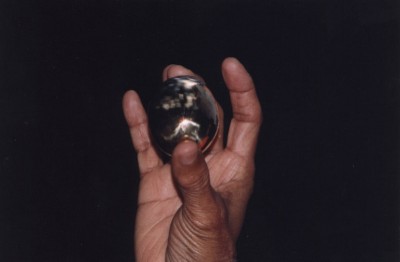
|
|

Divine grace depends on the heart of man.
Sairam,
Prashaanthi Nilayam, 1962
No one can liberate you because no one has bound you. You hold on to the nettie of worldly pleasure and you weep for pain. The kite is pursued by crows so long as it carries the fish in its beak; it twists and turns in the sky trying to dodge the crows who seek to snatch the fish; tired at last, it drops the fish. That moment it is free. The kite sits on a tree preening its wings and enjoying its happiness.
So grief and worry can harass you no more if you give up the attachment to the senses. You too can be so happy provided you drop the fish you have in your beak.
No Avathaar is born out of flesh and blood. The body of the Avathaar is chith (awarenessful) substance; it is not jada (inert) like other materials. The embryo of ordinary mortals is jalodhakashaayi (enveloped in watery stuff; the embryo of the Avathaar is encased in Ksheerodakashaayi (the pure white milk of holiness). That is why in the make-up of the Avathaar, there is no blemish and no trace of Guna.
Man comes into the world burdened with maaya and with its instrument (mind). The mind expresses itself through raaga and dhwesha (affection and hatred) towards the external world. Raaga is raajasik (passionate) in its effect and it can be used for one's uplift as Naaradha used it to fix attention on the Lord. Dhwesha is Thaamasik (negativistic) as Dhurvaasa expressed it in his dealings with Ambareesha and others. You get fixed on jnaana if there is no mind and maaya i.e., without Raaga and Dhwesha. There will be no manas or maaya (mind or illusion) if you let raaga and dhwesha go and let Raama enter. You can overcome raaga and dhwesha by discrimination, inquiry and reasoning.
The Thaitthireeya Upanishath analyses the mind and its behaviour and gives directions to the merge the mind in god with which you can foil the tactics of raaga and dhwesha. Have attachment to the Lord and aversion towards evil, pride and egoism. Water and fire are incompatible. Fire is put out by water. But, by means of fire, you can convert water into steam and use it to haul long lines of heavy wagons.
It is of no benefit and sounds hollow if a man talks about Raama without himself being inspired by the glory of the Lord it. It is like the image of a table heavy with edible dishes seen inside a mirror; the dishes in the mirror will not fill hungry stomach. No language can picture the actual bliss that the Name can confer; words can at best delineate only an atom of that joy.
Dhuryodhana stuck to falsehood, greed and envy but had a swell time, flags flying, festoons swinging and banquets everyday. Yudhishthira, eldest of the Paandavas had exile, poverty and privation as reward of his high morality. But in the case of Dhuryodhana, prosperity did not induce caution, humility or discrimination. So you revere Yudhishthira and execrate Dhuryodhana even after centuries after they died. Rama is revered as the emobodiment of Dharma as he never wavered for a moment in the path of Dharma. The Lord pile calamity on calamity and test a main to measure achievement and award marks and honours but not for fun and not because he enjoys it. You must ask to be examined so that your progress may be recorded.
The water in lakes, pits, wells and rivers is rain water but differs in taste, colour, name and form based on where the rain has fallen and how pure is the container. Divine grace is like rain, pure and pellucid falling on all. How it is received and used depends on the heart of man.
--SATHY SAI
Omsai srisai jaijaisai